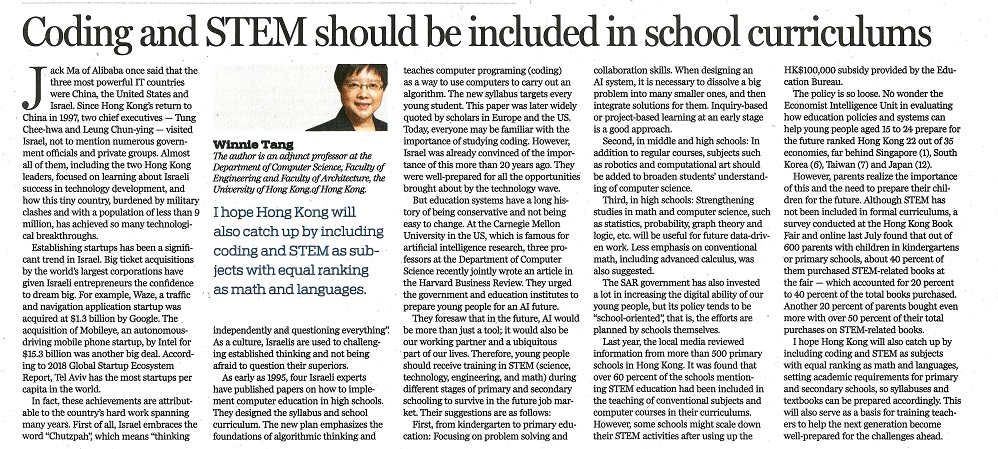網上版請按此

Coding and STEM should be included in school curriculums
Jack Ma of Alibaba once said that the three most powerful IT countries were China, the United States and Israel. Since Hong Kong's return to China in 1997, two chief executives — Tung Chee-hwa and Leung Chun-ying — visited Israel, not to mention numerous government officials and private groups. Almost all of them, including the two Hong Kong leaders, focused on learning about Israeli success in technology development, and how this tiny country, burdened by military clashes and with a population of less than 9 million, has achieved so many technological breakthroughs.
Establishing startups has been a significant trend in Israel. Big ticket acquisitions by the world's largest corporations have given Israeli entrepreneurs the confidence to dream big. For example, Waze, a traffic and navigation application startup was acquired at $1.3 billion by Google. The acquisition of Mobileye, an autonomous-driving mobile phone startup, by Intel for $15.3 billion was another big deal. According to 2018 Global Startup Ecosystem Report, Tel Aviv has the most startups per capita in the world.
In fact, these achievements are attributable to the country's hard work spanning many years. First of all, Israel embraces the word "Chutzpah", which means "thinking independently and questioning everything". As a culture, Israelis are used to challenging established thinking and not being afraid to question their superiors.
As early as 1995, four Israeli experts have published papers on how to implement computer education in high schools. They designed the syllabus and school curriculum. The new plan emphasizes the foundations of algorithmic thinking and teaches computer programing (coding) as a way to use computers to carry out an algorithm. The new syllabus targets every young student. This paper was later widely quoted by scholars in Europe and the US. Today, everyone may be familiar with the importance of studying coding. However, Israel was already convinced of the importance of this more than 20 years ago. They were well-prepared for all the opportunities brought about by the technology wave.
But education systems have a long history of being conservative and not being easy to change. At the Carnegie Mellon University in the US, which is famous for artificial intelligence research, three professors at the Department of Computer Science recently jointly wrote an article in the Harvard Business Review. They urged the government and education institutes to prepare young people for an AI future.
They foresaw that in the future, AI would be more than just a tool; it would also be our working partner and a ubiquitous part of our lives. Therefore, young people should receive training in STEM (science, technology, engineering, and math) during different stages of primary and secondary schooling to survive in the future job market. Their suggestions are as follows:
First, from kindergarten to primary education: Focusing on problem solving and collaboration skills. When designing an AI system, it is necessary to dissolve a big problem into many smaller ones, and then integrate solutions for them. Inquiry-based or project-based learning at an early stage is a good approach.Second, in middle and high schools: In addition to regular courses, subjects such as robotics and computational art should be added to broaden students’ understanding of computer science.
Third, in high schools: Strengthening studies in math and computer science, such as statistics, probability, graph theory and logic, etc. will be useful for future data-driven work. Less emphasis on conventional math, including advanced calculus, was also suggested.
The SAR government has also invested a lot in increasing the digital ability of our young people, but its policy tends to be "school-oriented", that is, the efforts are planned by schools themselves.
Last year, the local media reviewed information from more than 500 primary schools in Hong Kong. It was found that over 60 percent of the schools mentioning STEM education had been included in the teaching of conventional subjects and computer courses in their curriculums. However, some schools might scale down their STEM activities after using up the HK$100,000 subsidy provided by the Education Bureau.
The policy is so loose. No wonder the Economist Intelligence Unit in evaluating how education policies and systems can help young people aged 15 to 24 prepare for the future ranked Hong Kong 22 out of 35 economies, far behind Singapore (1), South Korea (6), Taiwan (7) and Japan (12).
However, parents realize the importance of this and the need to prepare their children for the future. Although STEM has not been included in formal curriculums, a survey conducted at the Hong Kong Book Fair and online last July found that out of 600 parents with children in kindergartens or primary schools, about 40 percent of them purchased STEM-related books at the fair — which accounted for 20 percent to 40 percent of the total books purchased. Another 20 percent of parents bought even more with over 50 percent of their total purchases on STEM-related books.
I hope Hong Kong will also catch up by including coding and STEM as subjects with equal ranking as math and languages, setting academic requirements for primary and secondary schools, so syllabuses and textbooks can be prepared accordingly. This will also serve as a basis for training teachers to help the next generation become well-prepared for the challenges ahead.
Dr. Winnie Tang
Adjunct Professor, Department of Computer Science, Faculty of Engineering and Faculty of Architecture, The University of Hong Kong